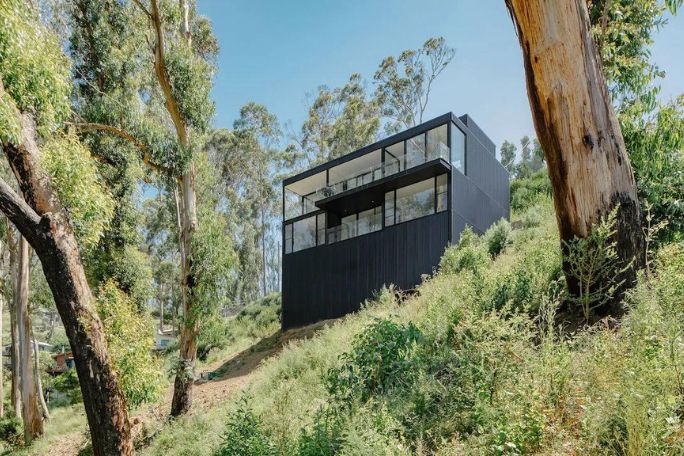Lesson summary
In order to create practical solutions that effectively address the impact of bushfires on people and property, students must become informed and gain a detailed understanding of the research and ideas already being implemented in the real world.
This set of resources challenges teachers and educators to expand their practice by utilising the design process methodology – an engaging, self-directed learning structure that guides students towards becoming experts so that they can ultimately design solutions that have a positive impact on people and communities.
This lesson guides students through the consideration of a variety of bushfire-resistant housing principles. It directs their thinking and independent research towards existing ideas of real-world scientists, engineers and designers working in this space, inspiring and informing students about potential solutions and how to implement them effectively as well as the potential limitations of these solutions. By the end of this stage students will have a clear picture of what works and what doesn’t and have a solid foundation for designing solutions going forward.
Learning intentions:
Students understand...
- the varied approaches to creating bushfire-resistant housing, including building materials, shape and features as well as environmental landscaping
Success criteria
Students can...
- critically evaluate the effectiveness of bushfire resistant housing design principles
Lesson guides and printables
Lesson details
Curriculum mapping
Australian Curriculum content descriptions:
Years 7 and 8 Design and Technologies:
- Analyse ways to produce designed solutions through selecting and combining characteristics and properties of materials, systems, components, tools and equipment (ACTDEK034)
- Critique needs or opportunities for designing and investigate, analyse and select from a range of materials, components, tools, equipment and processes to develop design ideas (ACTDEP035)
Syllabus outcomes: T4.3.1, T4.3.2, T4.1.1
General capabilities: Critical and Creative Thinking, Personal and Social Capability
Cross-curriculum priority: Sustainability
Relevant parts of Years 7 and 8 Design and Technologies achievement standards: Students explain how social, ethical, technical and sustainability considerations influence the design of innovative and enterprising solutions to meet a range of present and future needs. Students explain a range of needs, opportunities or problems and define them in terms of functional requirements and constraints. They collect, authenticate and interpret data. from a range of sources to assist in making informed judgements. Students generate and document in digital and non-digital form, design ideas for different audiences using appropriate technical terms, and graphical representation techniques including algorithms.
This lesson is part of the wider unit of work Beyond the Bushfires: Bushfire Resistant Housing
Time required: 100 mins
Level of teacher scaffolding: Medium – Facilitate class discussion, support student thinking, scaffold students through tasks and resources.
Be aware that the Design Process challenges the traditional roles in learning of instructors as the main disseminator of information and students having reduced agency. In this model, the instructor’s task is to challenge students’ pre-conceived ideas, foster their curiosity, pose challenging questions, and provide support and guidance to students as they are self-directed in pursuing knowledge.
Resources required
- Design Document – physical or digital – one copy per student
- Device capable of presenting a video to the class
- Handling Sensitive Topics and Issues factsheet
Skills
This lesson is designed to build students’ competencies in the following skills:
- Critical thinking
- Digital literacy
- Enterprise
- Adaptability
- Initiative
Additional info
In partnership with The Conversation, the Beyond the Bushfires series brings the words of scientists who are actively involved in research and science communication into classrooms throughout Australia. Students will explore evidence-based research embedded in the context of real-world practice.
Additional thanks to the Ian Potter Foundation, John T Reid Charitable Trusts and The Myer Foundation, for generously supporting the development of these lessons.


Welcome back!
Don't have an account yet?
Log in with:
By signing up to Cool.org you consent and agree to Cool's privacy policy to
store, manage and process your personal information. To read more, please see
our privacy policy here(Opens in new tab).
Create your free Cool.org account.
Many of our resources are free, with an option to upgrade to Cool+ for premium content.
Already have an account?
Sign up with:
By signing up to Cool.org you consent and agree to Cool's privacy policy to
store, manage and process your personal information. To read more, please see
our privacy policy here(Opens in new tab).